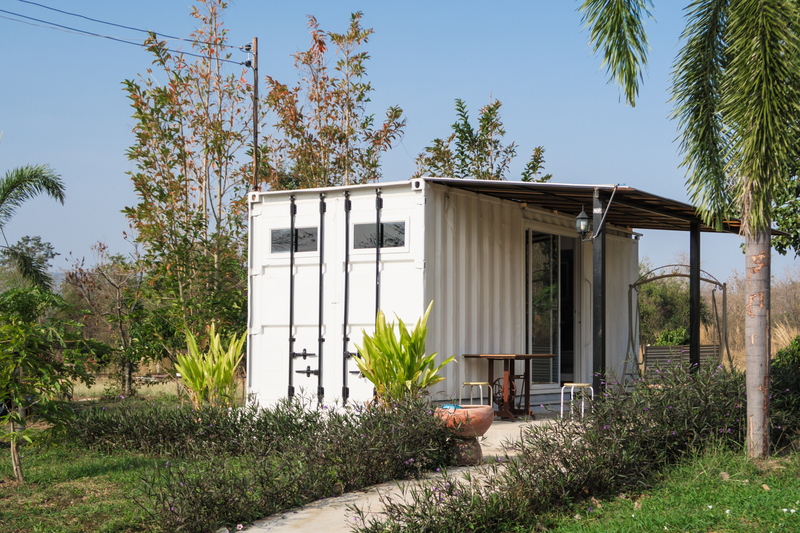Mini Skips: Optimizing Space and Efficiency in Waste Disposal
Efficient waste disposal is a growing challenge in urban and suburban environments. As cities expand and construction projects proliferate, finding effective ways to manage rubbish and debris becomes crucial. Mini skips have emerged as a leading solution, offering an optimal balance between space-saving design and cost-effective waste removal. In this comprehensive guide, we will explore mini skips, their various applications, and why they have become a staple in modern waste management strategies.

What Are Mini Skips?
Mini skips, sometimes known as small skips, are compact waste containers designed for quick and easy rubbish collection. Unlike standard skip bins, mini skips usually range in size from 2 cubic yards to 4 cubic yards, making them ideal for small residential, commercial, or garden projects where space is at a premium.
Key Features of Mini Skips
- Compact Size: Easy to position in driveways, tight streets, or restricted spaces.
- Cost-Effective: Lower hire fees and reduced landfill charges for small waste volumes.
- Convenient: Perfect for quick clean-ups, DIY renovations, or landscaping projects.
- Environmentally Friendly: Many providers offer waste sorting and recycling services as part of the hire cost.
Understanding the sizes and capacities of mini skips is essential for selecting the right option for your waste disposal needs. They are widely preferred for their ability to fit in smaller spaces and manage limited yet frequent waste loads efficiently.
The Importance of Space Optimization in Waste Disposal
In densely-populated urban areas or commercial settings, open space is often limited. Traditional large skip bins may be impractical or even prohibited by local councils, especially in locations with parking constraints, narrow access roads, or stringent waste management regulations. Here, mini skip bins offer a versatile and flexible alternative.
Benefits of Space Optimization
- Preserve Valuable Real Estate: Mini skips can be placed where larger bins simply won't fit, maximizing the use of available space.
- Minimize Disruption: Their compact profile means less obstruction on streets or driveways.
- Reduce Environmental Footprint: Smaller loads make it easier to sort and recycle materials, driving sustainable waste management.
With good planning, mini skips help households and businesses avoid excessive waste accumulation and ensure a cleaner, safer environment.
Applications of Mini Skips in Waste Management
Mini skips are suitable for a broad range of projects and sectors. Their popularity stems from their ability to adapt to different requirements, making them indispensable for the following uses:
Residential Clean-ups
- Spring Cleaning: Dispose of unwanted items after decluttering your home or garage.
- Garden Waste: Remove hedge trimmings, weeds, soil, and small tree branches.
- Home Renovations: Perfect for minor kitchen or bathroom upgrades, where waste volume is moderate.
Commercial and Retail Projects
- Office Cleanouts: Clear old furniture, files, and electronics efficiently.
- Retail Refits: Discard display materials, shelving, or packaging waste after store upgrades.
Event Waste Management
- Public Events: Manage litter and recyclable materials during festivals, community fairs, or sports matches.
- Construction Sites: Useful for isolated task areas or as supplementary bins for specific waste streams.
These scenarios highlight how mini skip hire optimizes workflow by streamlining waste removal, reducing labour costs, and ensuring sites remain tidy and compliant with regulations.
Choosing the Right Mini Skip for Your Project
Selecting the correct skip size is crucial for maximizing efficiency and minimizing costs. Here are the main types of mini skips commonly available:
- 2-Yard Mini Skip: Best for minor household tasks or garden maintenance. Typically holds around 20-30 bin bags.
- 3-Yard Mini Skip: Ideal for room renovations or small disposal jobs; about 30-40 bin bags capacity.
- 4-Yard Small Skip: Suitable for slightly larger jobs without occupying much space; holds up to 50 bin bags.
Factors to Consider
- Waste Type: Confirm what you plan to dispose of (general household, green waste, light construction material).
- Access and Placement: Ensure there are no obstructions and that delivery vehicles can access the site.
- Permits: If placing a mini skip on public roads or footpaths, check with your local council about necessary permits.
Choosing appropriately helps avoid overfilling, extra hires, and unnecessary expenses, ensuring both environmental and financial efficiency.
How Mini Skips Improve Waste Management Efficiency
Several factors make mini skips a leader in efficient waste disposal:
1. Streamlined Collection and Removal
- Smaller skip sizes mean faster drop-offs and pickups.
- Reduced waiting times keep projects on schedule.
- Minimize the risk of illegal dumping or waste pileups.
2. Segregation of Waste Streams
- Dedicated skips for organic, recyclable, or hazardous materials.
- Prevents contamination and simplifies downstream processing at recycling facilities.
3. Flexible Scheduling
- Short-term hires for quick tasks and long-term placements for ongoing projects.
- Service providers often offer same-day or next-day delivery and collection.
4. Supports Circular Economy Initiatives
- Facilitates material sorting and recovery for reuse or recycling.
- Reduces overall landfill dependency and carbon footprint.
By facilitating effective collection, segregation, and recycling efforts, hiring a mini skip directly supports environmental responsibility while optimizing on-site efficiency.
Tips for Maximizing Space in Mini Skips
To get the most value from your mini skip hire, it's essential to load the skip efficiently. Here are some proven strategies to help you make the most of every cubic yard:
- Break Down Items: Disassemble bulky furniture, crush boxes, and flatten plastic containers.
- Layer Your Waste: Place flat and heavy items at the bottom, then fill gaps with lighter materials.
- Do Not Overfill: For safety and compliance, waste should never exceed the rim of the mini skip.
- Sort Waste: Segregate recyclables and hazardous materials according to guidelines to avoid surcharges or refusal of collection.
- Call for Early Collection: If the skip is full before the hire period ends, request early removal to keep the workflow uninterrupted.
Efficient stacking and sorting ensure you avoid fines, maximize working space, and operate within local regulations.
Environmental Benefits of Mini Skips
Sustainability is a core consideration in modern waste management. The use of mini skips brings clear environmental advantages:
Reduced Truck Movements
- Smaller skips mean lighter loads, which reduce fuel consumption per trip.
- Encourages batch collection and fewer journeys for smaller quantities.
Promotes Recycling
- Compartmentalized waste is easier to process and recycle.
- Skips often come with clear guidance on segregation, reducing cross-contamination.
Less Visual Pollution
- Compact size ensures skips blend better into neighbourhoods or work sites.
- Discourages fly-tipping and associated urban blight.
The cumulative effect of these benefits is a cleaner, greener, and safer community.
Mini Skip Hire: Steps and Best Practices
Hiring a mini skip is a straightforward process. Here's what you should expect and the best practices to follow:
- Identify Your Waste Type and Volume: Assess your project to estimate the right skip size.
- Contact a Reputed Mini Skip Provider: Look for licensed, insured operators with transparent pricing and customer support.
- Arrange Delivery and Location: Coordinate with the provider to ensure accessible, legal placement. Ask about public land permits if needed.
- Fill the Mini Skip Considering Safety: Avoid overloading, and do not dispose of prohibited items (e.g., asbestos, batteries, chemicals).
- Book Collection Promptly: Notify the provider when your skip is ready for removal to keep the area hazard-free.
- Request a Recycling Report: Some providers offer documentation detailing how your waste was processed, supporting environmental accountability.
These steps ensure efficient, lawful, and sustainable waste removal tailored to your specific project.
Cost Considerations: Maximizing Value for Money
One of the main reasons for the popularity of mini skip bin hire is its affordability. However, costs can vary based on several factors:
- Location: Urban centers may have higher rates due to logistics and demand.
- Skip Size and Rental Duration: Longer rental or larger skip sizes increase the price.
- Waste Type: Specialized skips or disposal for certain waste (like plasterboard, soil, or hazardous materials) may incur higher fees.
- Permit Requirements: Council permits, where required, add to overall expenses.
To ensure you get the best value, compare quotes from local providers, inquire about included recycling, and avoid overfilling to sidestep penalties.
Mini Skips vs. Traditional Skip Bins
How do mini skips stack up against their larger counterparts?
- Flexibility: Mini skips easily fit in areas unsuitable for standard skips.
- Affordability: Typically less expensive, making them the top choice for small projects or restricted budgets.
- Convenience: Easier and faster to deliver, fill, and collect.
- Environmental Impact: Promote waste segregation and easier recycling.
While traditional skip bins are essential for major construction or demolition projects, mini skips deliver unmatched advantages for everyday tasks, residential cleanouts, and lightweight commercial waste.

Frequently Asked Questions About Mini Skips
What can I put in a mini skip?
- General household items (toys, clothing, furniture)
- Garden waste (shrubs, soil, grass)
- Small quantities of construction debris (tiles, timber)
- Metal, plastics, and packaging
Note: Hazardous materials, chemicals, asbestos, tyres, and electrical appliances are generally not accepted. Always check with your provider.
How long can I keep a mini skip?
Most suppliers offer rental periods ranging from 3 days to 1 week, with extensions available upon request.
Do I need a permit for a mini skip?
If the skip is placed entirely on your private property, a permit is usually not required. If positioned on a public road or footpath, check with your local council for regulations and permit requirements.
Conclusion: Space and Efficiency in Modern Waste Management
Mini skips play a vital role in optimizing space and maximizing efficiency for waste disposal. By offering a tailored, flexible solution for varied environments -- from urban homes to busy construction sites -- mini skips make it easier than ever to keep spaces clean, organized, and eco-friendly. Their compact design, cost benefits, and support for recycling initiatives make them an indispensable tool in the pursuit of responsible, efficient waste management.
Whether you are undertaking a small renovation, organizing a community event, or maintaining a garden, mini skips provide the perfect waste solution for projects where space and effectiveness matter most. Consider mini skip bin hire the next time you need a fast, affordable, and environmentally responsible way to handle your waste.